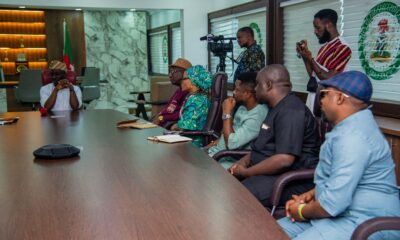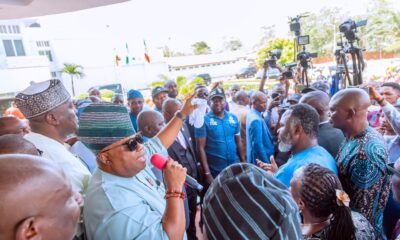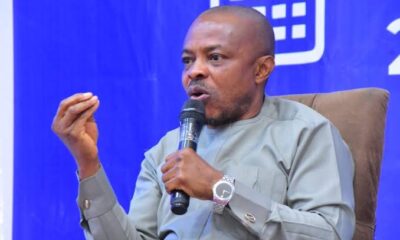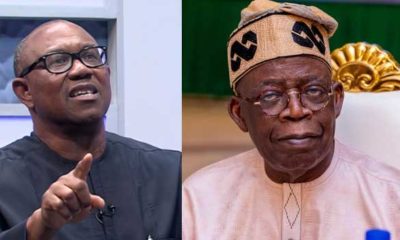NEWS
Tinubu Sneaks-In N35,000 Minimum Wage, Claims Talks With Organised Labour
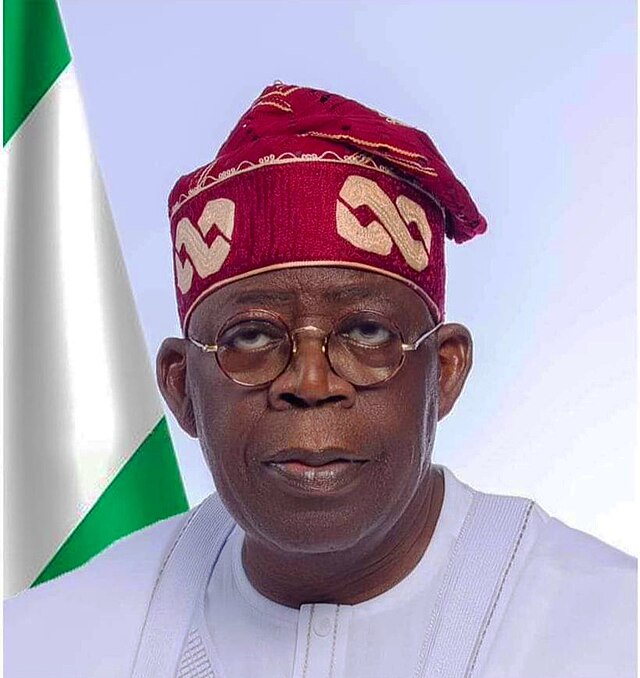
President Bola Ahmed Tinubu has revealed that his government is already paying a minimum wage of N35,000 already in talks with organised labour and other tiers of government to ensure uniform implementation in Nigeria.
He made the disclosure while speaking to Editors of The Nation newspaper, who voted him as Person of the Year.
He assured that when a formal agreement is reached with organised labour, the coming wage structure would be practical, sustainable and implementable by all layers of government.
On his journey so far as Nigeria’s President, he pointed to the economic reforms introduced by his government, which he claimed have been manifesting positive dividends.
These, according to him, include $616m in Foreign Direct Investment (FDI) pledges.
Reminded about the current cost-of-living crisis in the country caused by spiraling inflation, high petrol price, and currency devaluation, Tinubu said, “As your President, I am deeply aware of the economic crisis’s severe impact on Nigerians, and we are part of a global challenge with the rising costs of living.
“To help our people, my administration is taking proactive steps. We are focused on providing financial support to businesses and ensuring the availability and affordability of staple foods, which are essential for every Nigerian family.
“One of our key initiatives is the provision of N25,000 monthly to 15 million households, for a three-month period. To further support food security, we’re working with our partners, local and international, to improve agricultural practices and provide essential resources to farmers.
“In addition, the National Single Window Project is being implemented to enhance international trade efficiency.
“All these efforts are in line with our commitment to reducing the economic burden on our citizens, especially the working class and vulnerable groups.”
According to him, the reallocation of funds from the removal of the petrol subsidy is also “a strategic move to bolster our government’s finances, contributing to a stable economic environment for all.”
He added, “In our commitment to ease the economic strain on our citizens, particularly the working class and vulnerable groups, my administration is championing the shift to cleaner energy sources.
“We recognize the benefits of Compressed Natural Gas (CNG) in providing an affordable and cleaner mass transit system. To facilitate this, we have waived the Value Added Tax (VAT) on CNG purchases.
“Additionally, to reduce the costs in food transportation and manufacturing, we’ve also waived VAT on diesel for six months.”
He acknowledged that “these massively important reforms have been hard” but pointed out that they have started yielding positive results for the country.
His words, “The dividends are already manifesting, with even more in sight. We have already seen improvements in our economic outlook, as corroborated by the likes of Fitch and Moody’s. These may seem ‘academic’ to many but the impact on investor confidence is significant.”
Asked to respond to criticism of the cash transfer initiative of his government, which some see as superficial and incapable of addressing the level of poverty in the land, Tinubu insisted that he remains steadfast in “my belief in the efficacy of our cash transfer initiatives.”
He said, “These initiatives are a crucial part of our strategy to target and provide relief to the most vulnerable segments of our population, especially during the last three months of the year when the prices of basic items typically rise.
“This is not just about providing temporary support; it’s about strategically delivering assistance when it’s needed most. We continue to work closely with all key stakeholders – including state governments, civil society groups, international partners, and private sector entities like telcos and fintechs – to refine these programs. Moreover, we urge all Nigerians to be mindful of the current economic situation and avoid exploiting it for abnormal profits.
“In addition to these cash transfers, my administration is deeply committed to empowering micro, small, and medium-sized enterprises, along with nano businesses. Significant financial support is being directed to these enterprises to foster human capital development, economic growth, and financial inclusion.
“For instance, through the Ministry of Communications, Innovation, and Digital Economy, we launched the 3MTT programme, aiming to develop technical talent across Nigeria in fields such as software engineering and cloud computing. This program is designed not just to aid businesses but also to enable our youth to participate in the global gig economy, earning competitive wages while contributing to our nation’s growth.
“Our interventions extend beyond what some may call ‘cash handouts’. They are about creating a sustainable environment where Nigerians can innovate and thrive.
“By focusing on sectors like digital and creative industries, we are fostering growth and job creation, harmonizing efforts between monetary and fiscal bodies to build a stronger, more resilient Nigeria.”
On the planned new wage structure, why it is yet to take off and fears about the ability of some of the states to implement it when the last one has not even been fully adopted all over the country, the president said, “I understand the concerns regarding the unveiling of the new minimum wage and how states will manage these changes, especially those with fewer resources.
“To address this, my administration has approved a provisional increase in the federal minimum wage to N35,000 per month for a six-month period, two months of which have already been paid. This decision follows extensive consultations with the Nigeria Labour Congress (NLC) and Trade Union Congress (TUC).
“In managing the situation with the states, we are working closely with them to ensure the new wage structure is practical and sustainable. It’s important that each state’s unique financial situation is considered.
“We are focused on strategies to help states strengthen their economies, considering factors like tax efficiency and economic diversification.
“We are committed to ongoing dialogues with labour unions and state governments. This collaborative approach is crucial to ensure that the new minimum wage is fair, reasonable, and implementable across all states.
“Our goal is to balance the economic well-being of our workers with the overall financial health of the nation.
“We ask Nigerians to rest assured that my administration will not rest until we have delivered a sustainable solution in the best interest of Nigerians.”
Tinubu, in response to a question on the benefits of his economic missions to some parts of the world so far, said, “It is essential to place our initiatives within the broader context of our economic recovery and growth strategy. This strategy encompasses several key reforms, including the removal of fuel subsidies, the unification of the naira’s exchange rates, the adoption of the customs single-window, the streamlining of our tax system and enhancement and diversification of our revenues.
“These strategic moves are designed to enhance liquidity and create a more attractive investment environment for both domestic and foreign investors, thereby stimulating sustainable growth.
Foreign Direct Investment (FDI) is not ‘chicken change’. FDI is substantial, long-term financial commitments made by serious enterprises and investors.
“What is happening right now is that Nigeria is re-engaging with the global market – both foreign and domestic investors. We are telling the story of our significant and far-reaching reforms and rebuilding confidence in Nigeria as an accessible and safe investment.
“We are clearly communicating that ‘Nigeria is open for business’ and that the direction of travel is clear and fully committed.
“So far, our pursuit of foreign direct investment has been met with positive outcomes. We’ve secured a $500 million deal with Germany to fund renewable energy projects, particularly in rural Nigeria.
“Additionally, through local enterprises, Nigeria will supply LNG yearly to Germany, starting in 2026, solidifying our role as a key global energy partner. Our focused efforts to attract European FDI are yielding fruit, notably with the $116 million French investment in the I-DICE program, aimed at creating 65,000 start-ups and 150,000 jobs, particularly empowering women.
“As announced on the side-lines of COP28 in Dubai, we’re deploying 100 electric buses nationally, affirming our commitment to sustainable, eco-friendly initiatives and creating a platform for Public-Private-Partnerships in the mass transit category.
“Since this announcement we have received serious requests for co-investment opportunities from within Nigeria and across the world – Europe, India, China and the Middle East, key global markets my administration has been energetically engaging with.”
NEWS
Defamation Battle: Yahaya Bello Demands Arrest Of Senator Natasha
Former Kogi State Governor, Yahaya Bello, has taken legal steps against Senator Natasha Akpoti-Uduaghan, accusing her of defamation and incitement.
Bello, through his lawyer N.A. Abubakar, on Wednesday petitioned the Inspector General of Police, urging the force to invite the senator to present evidence backing the allegations she made against him at a recent event.
READ MORE: Drop Akpabio’s Petition, Probe Threats Against My Life – Senator Natasha To IGP
The former governor insists that Senator Akpoti-Uduaghan falsely accused him of being involved in an assassination plot during her homecoming ceremony on April 1, 2025, in Okehi Local Government Area of Kogi State.
The petition described her statements as both “malicious” and harmful, urging the police to prosecute her if she fails to justify her claims.
“Where she fails to do so, cause her to be arrested and prosecuted in accordance with the provisions of the law for criminal defamation, inciting public disturbance, and spreading false information injurious to public peace,” Bello’s lawyer wrote in the petition.
In addition to involving the police, Bello has also sent a personal demand letter to the senator via another lawyer, R.O. Balogun, asking her to issue a retraction and a public apology or risk facing legal consequences.
Bello’s legal team argues that her allegations violate Section 24(1)(b) of the Cybercrimes (Prohibition, Prevention, Etc.) Act, 2015.
“By accusing our client of plotting an assassination and naming him as a co-conspirator in a purported murder plot (with an attempt to disguise the killing as mob or ethnic violence), Sen. Akpoti-Uduaghan has:
“Gravely damaged our client’s reputation by portraying him as a violent and vengeful political actor and misled the public and tried to incite ethnic and political distrust, especially among clans of Ebiraland in particular and the people of Kogi Central in general.
“Brought his name into disrepute on the basis of an allegation so weighty that, if left unchallenged, could harm his political career and personal safety; and abused her parliamentary status and platform by propagating such falsehoods without evidence, in a very public and politically charged setting,” the solicitor noted.
NEWS
‘No Such Meeting’ — Rivers Sole Administrator Denies Summoning Fubara, Deputy
The Rivers State Government has debunked reports making the rounds on social media, which alleged that the Sole Administrator of the state, Vice Admiral Ibok-Etteh Ibas (Rtd.), had summoned suspended Governor Sir Siminalayi Fubara and his deputy, Prof. Ngozi Nma Odu, to a meeting scheduled for Friday, April 18, 2025.
In an official statement released on Wednesday, the administration described the report as entirely false and intended to mislead the public.
The government warned against the spread of fake news, which it said was a calculated attempt to create panic and destabilize the state.
READ ALSO: “I Have No Connection To Militants’ – Fubara
The statement, signed by Sir Dede Sampson Friday, Permanent Secretary from the Office of the Secretary to the State Government (SSG), condemned the social media posts, which it labeled as malicious and fraudulent.
“The Rivers State Government has become aware of fraudulent announcements circulating on social media, falsely attributed to the Office of the Secretary to the State Government,” the statement noted.
“These malicious fabrications are designed to mislead the public, create panic, and disrupt the peace in Rivers State.”
One of the false messages specifically claimed that Governor Fubara and his deputy had been invited to Government House to answer questions regarding appointments and other matters of state.
Reacting to this, the state government firmly dismissed the announcement as fake and emphasized that no such directive was ever issued.
“The Rivers State Government categorically states that this announcement is fake and did not originate from any official source.
The public is urged to disregard this and any similar misinformation, as they are the work of troublemakers seeking to destabilize the state.”
The government further urged citizens to remain cautious and seek information only through verified platforms, highlighting the state’s official website — www.riversstate.gov.ng — as a reliable source for accurate updates.
NEWS
Otukpo Killings: Gov Alia Confirms Arrests, Calls For More Security Deployment
Following the deadly attack on Otobi community in Otukpo Local Government Area of Benue State, Governor Hyacinth Alia has confirmed the arrest of two suspects linked to the killings.
The attack, which took place on Tuesday evening, saw suspected armed herders invade the community, unleashing violence that left at least eleven people dead.
Several houses were set ablaze during the onslaught, forcing many residents to flee to nearby villages.
READ ALSO: No Safety Guarantee For Unscheduled Visitors To Benue – Gov Alia
Speaking to journalists on Wednesday, Governor Alia described the attack as “condemnable” and assured the public that security agencies were working to track down everyone involved.
He also disclosed that three suspected herdsmen had been apprehended in connection with the incident.
“The National Security Advisor has promised to deploy more security operatives to the state following the current wave of attacks in the state, particularly, the incessant attacks on Otukpo,” Alia said.
He further appealed to security personnel to intensify efforts in ensuring the perpetrators are brought to book.
Reacting to the incident, the lawmaker representing Otukpo constituency in the Benue State House of Assembly, Kennedy Angbo, confirmed the attack and shared that the assailants stormed the community around 5:30 pm on Tuesday.
Angbo noted that nine bodies were recovered on the night of the attack, while two more were discovered on Wednesday morning.
He also added that several survivors who sustained injuries are currently receiving medical attention in Otukpo.
Meanwhile, security operatives have reportedly been deployed to the area as authorities intensify efforts to restore calm and prevent further attacks.

